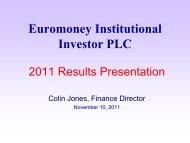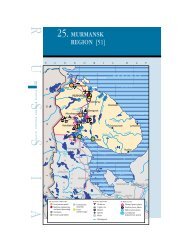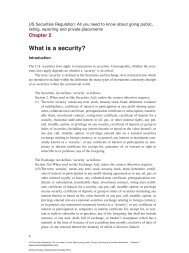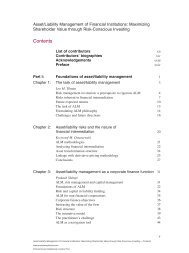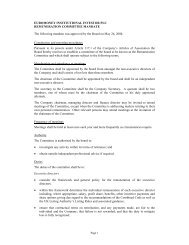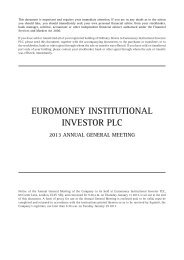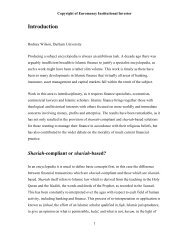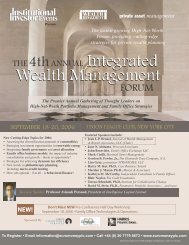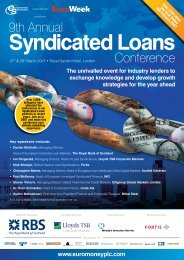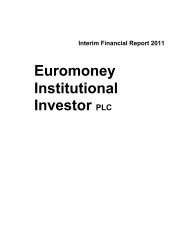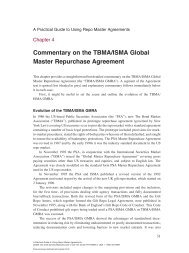Annual Report & Accounts 2012 - Euromoney Institutional Investor ...
Annual Report & Accounts 2012 - Euromoney Institutional Investor ...
Annual Report & Accounts 2012 - Euromoney Institutional Investor ...
Create successful ePaper yourself
Turn your PDF publications into a flip-book with our unique Google optimized e-Paper software.
<strong>Euromoney</strong> <strong>Institutional</strong> <strong>Investor</strong> PLC <strong>Annual</strong> <strong>Report</strong> and <strong>Accounts</strong> <strong>2012</strong><br />
www.euromoneyplc.com<br />
Our Performance<br />
1 Accounting policies continued<br />
Basis of consolidation<br />
(a) Subsidiaries<br />
The consolidated accounts incorporate the accounts of the company and<br />
entities controlled by the company (its ‘subsidiaries’). Control is achieved<br />
where the company has the power to govern the financial and operating<br />
policies of an investee entity so as to obtain benefits from its activities.<br />
Intercompany transactions, balances and unrealised gains and losses on<br />
transactions between group companies are eliminated.<br />
The group uses the acquisition method of accounting to account for<br />
business combinations. The amount recognised as consideration by<br />
the group equates to the fair value of the assets, liabilities and equity<br />
acquired by the group plus contingent consideration (should there be any<br />
such arrangement). Acquisition related costs are expensed as incurred.<br />
Identifiable assets acquired and liabilities and contingent liabilities<br />
assumed in a business combination are measured initially at their fair<br />
values at acquisition. On an acquisition-by-acquisition basis, the group<br />
recognises any non-controlling interest in the acquiree either at fair value<br />
or at the non-controlling interests proportionate share of the acquiree’s<br />
net assets.<br />
To the extent the consideration (including the assumed contingent<br />
consideration) provided by the acquirer is greater than the fair value of the<br />
assets and liabilities, this amount is recognised as goodwill. Goodwill also<br />
incorporates the amount of any non-controlling interest in the acquiree<br />
and the acquisition date fair value of any previous equity interest in the<br />
acquiree over the fair value of the group’s share of the identifiable net<br />
assets acquired.<br />
If this is less than the fair value of the net assets of the subsidiary acquired,<br />
the difference is recognised directly in the Statement of Comprehensive<br />
Income.<br />
Partial acquisitions – control unaffected<br />
Where the group acquires an additional interest in an entity in which<br />
a controlling interest is already held, the consideration paid for the<br />
additional interest is reflected within movements in equity as a reduction<br />
in non-controlling interests. No goodwill is recognised.<br />
Step acquisitions – control passes to the group<br />
Where a business combination is achieved in stages, at the stage at which<br />
control passes to the group, the previously held interest is treated as if it<br />
had been disposed of, along with the consideration paid for the controlling<br />
interest in the subsidiary. The fair value of the previously held interest then<br />
forms one of the components that is used to calculate goodwill, along<br />
with the consideration and the non-controlling interest less the fair value<br />
of identifiable net assets.<br />
The consideration paid for the earlier stages of a step acquisition, before<br />
control passes to the group, is treated as an investment in an associate.<br />
(b) Transactions and non-controlling interests<br />
Transactions with non-controlling interests in the net assets of consolidated<br />
subsidiaries are identified separately and included in the group’s equity.<br />
Non-controlling interests consist of the amount of those interests at the<br />
date of the original business combination and its share of changes in<br />
equity since the date of the combination. Total comprehensive income<br />
is attributed to non-controlling interests even if this results in the noncontrolling<br />
interests having a deficit balance.<br />
Where the group owns a non-controlling interest in the equity share capital<br />
of a non-quoted company and does not exercise significant influence, it is<br />
held as an investment and stated in the balance sheet at the lower of cost<br />
and net realisable value.<br />
(c) Associates<br />
An associate is an entity over which the group is in a position to exercise<br />
significant influence, but not control or joint control, through participation<br />
in the financial and operating policy decisions of the investee. The results<br />
and assets and liabilities of associates are incorporated in these financial<br />
statements using the equity method of accounting and are initially<br />
recognised at cost. The group’s investment in associates includes goodwill<br />
identified on acquisition, net of any accumulated impairment loss.<br />
The group’s share of associate post-acquisition profit or losses is recognised<br />
in the Income Statement, and its share of post-acquisition movements<br />
in other comprehensive income is recognised in other comprehensive<br />
income. The cumulative post-acquisition movements are adjusted against<br />
the carrying amount of the investment. When the group’s share of losses<br />
in an associate equals its interest in the associate, including any other<br />
unsecured receivables, the group does not recognise further losses, unless<br />
it has incurred obligations or made payments on behalf of the associate.<br />
Unrealised gains on transactions between the group and its associates<br />
are eliminated to the extent of the group’s interest in the associates.<br />
Unrealised losses are also eliminated unless the transaction provides<br />
evidence of an impairment of the asset transferred. Accounting policies of<br />
associates have been changed where necessary to ensure consistency with<br />
the policies adopted by the group.<br />
Dilution gains and losses arising in investments in associates are recognised<br />
in the Income Statement.<br />
Notes to the Consolidated Financial Statements<br />
Company <strong>Accounts</strong> Group <strong>Accounts</strong> Our Governance<br />
63





